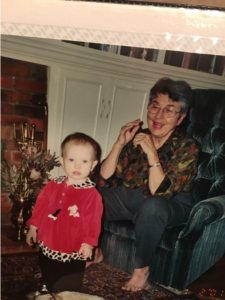By: Katie Kovarik
Major: English, Sports Broadcasting, and Political Science
Year: Junior
Hometown: Denver, CO
Separated by a generation but united by the same personality and the same mutually-disliked nose-shape, my ninety-two-year-old grandmother and myself have coincidently found ourselves in shockingly parallel situations as of late. Since my dad decided to establish his own family a mere five minutes from where he grew up, I had unlimited access to the woman who raised him. While physically close, our personalities seemed even chummier. My grandmother and I have similarities stemming for stubborn-headedness at our worst, our genuine care for others at our best, and our almost intolerable craving for chocolate at all times. She is the woman I still call to this day for reassurance after an upsetting grade, comfort during a spell of homesickness, or for wholesome life advice that is truly only requested from her. I wouldn’t be who I am today without her tough love and endless direction.
My grandmother, known adoringly as Grandee, was born one of seven on a small South Dakotan farm in 1927. Getting far away from the life on the farm she dreaded, she spent over five decades of her life in the same seven-bedroom house in Cherry Hills Village, Colorado. The timelessness of her house’s exterior can’t be understated—from beautifully laid red bricks to concrete lions guarding her front door—it has stood the test of time. The inside, however, has been constantly evolving—from shag carpet in the 1960s to incredibly detailed wallpaper in the 1980s. The house transformed with and adapted to the growing family that lived in it.

In this home, she raised her own six children and hid her undisclosed Democratic leanings from her loving, yet conservative, husband. She stayed at home and gave up her own medical training to raise her kids and cook three meals a day for years on end. Reflecting on her life, Grandee believes that the move away from her childhood farm into a much more unpredictable world allowed her to pursue larger life objectives and even allowed her children to dream big about the world. With my aunts and uncles, Grandee’s children, now living across the country—from Southern California to Phoenix to Chicago—and pursuing a variety of careers—from a veterinarian to a lawyer to an interior designer—she has been able to see such imaginings become a reality.
It was only after all her children had officially moved out of the house and my grandfather passed that my social grandmother actively spent time traveling to see her friends and driving them to dinners weekly. Grandee loved her house but would actively find ways to get out of it, from bridge club meetings to monthly dinners with lifelong friends.
For as long as I can remember, I have always loved Grandee’s house. Looking at her basement as literally a time capsule from when my own father was in high school, I have cherished the memories that preceded me and that it holds. As I grew up, Grandee was aging right before my eyes, but I never wanted to admit it. From her eventual dependence on a walker to increased trepidation leaving the house, I tried to overlook such hindrances. While I studied to get my driving permit, Grandee decided that she would turn in her own license. The world of possibilities opened up to me as my transportation was no longer dependent on someone else; however, the exact opposite became true for Grandee. At the time, I saw such a situation as a win for me—access to a car and time with my grandmother—yet, the immense amount of independence lost by that one action and the isolated life she began to live in her home tore Grandee up more than she will ever admit.
As I enter my third year of college, I have grown all too familiar with being away from my parents, Grandee’s house, and the state of Colorado. My over-consumption of queso and my shock over the size of bugs in Texas have subsided; however, the underlying fear of something happening to Grandee is a worry that plagues me every time I say goodbye to her as I return to school. Unfortunately, at the beginning of August of this year, the night before I was scheduled to fly back to Fort Worth, I got an incredibly unexpected phone call from Grandee at 12:31 am—a time way past her regular bedtime of 8:30 pm. The muffled words of, “Katie…I’ve fallen and can’t get up…But I don’t want the damn Life Alert people to break down my doors” echoed in my ears.
Flashforward to 3:30 AM: Grandee was safely in the emergency room wing of Swedish Hospital in Denver. Her bloody leg was merely a flesh wound, yet her broken right shoulder posed the real pain to her and shock to me and my parents. In typical “me” fashion, the surprise of the night and the sight of an open wound resulted in me dramatically fainting twice and ending up in the emergency room gurney next to Grandee. Obviously, my parents were horrified by the situation, but not surprisingly, my grandmother and I both started laughing at our sorry state.
It has been almost a month since Grandee’s fall, my return to Texas, and my own move into my first off-campus house. At the rehabilitation center, I call her regularly to give her some company. We may be at very different stages in our lives; nevertheless, we seem to have found a lot of commonalities in our recent situations that extend past our unfortunate night at the hospital.
“Katie, I just learned today that I won’t be returning back to my home,” was her greeting to me this week as soon as I picked up my vibrating phone. Grandee’s stay in the rehabilitation center is coming to a close soon, and her initial plan to go right back to her house of fifty years was shattered by my father’s desire to keep her safe. Grandee’s life since relinquishing her car and since I have left for college has been one of more isolation and silence than she has had at any other time in her life. My dad’s decision to place his mom in an assisted living facility has been one he has avoided for ten years, reasoning that Grandee’s strong personality and sense of independence was a good enough reason to allow her to remain in her beloved home.
Yet, the time had now come for Grandee to live somewhere where falls wouldn’t occur and helpful company would be in abundance. “I guess it is hard for me to think of not being in that house, but I haven’t been able to go down to that basement in decades… and the house hasn’t felt the same in a while;” Grandee’s modifications to the home include the disappearance of pans to reflect her love of frozen dinners and not cooking, the fitting of a chair lift for her to sleep in her upstairs bedroom, and the installation of a walk-in bath to keep her routine intact. Her house was going to continue to adapt and change just as it had always done before. Obviously, leaving was never in the cards.
Likewise, I wasn’t one of those teenagers itching to get out of my parent’s house. With both of my parents living the lifestyle of prominent attorneys, they really weren’t home that much to nag me about homework or try and dictate all aspects of my life. I was able to mature quickly and grow to see my parents as mentors and friends rather than disciplinaries. I loved life at home. An unlimited supply of food, a decent amount of time with my family and with myself, and a whole lot of control over my life (without having to deal with the stresses of utility bills and rent). When it finally resonated with me that I would be going out of state for school, the comfort I associated with my parent’s house quickly became more and more valuable to me. If it was so hard for me to say goodbye to a home I’ve known for about ten years of my life, it becomes largely impossible for me to understand how Grandee’s move feels for her.
Flash forward to now, having lived in my sorority’s on-campus housing last year and currently living in a house with four other girls, I realize that along with keeping up with the water and electricity bills, I now always have people to talk to—when I want to and even when I don’t. This is in contrast to Grandee, whose largely isolated lifestyle—adopted after giving up her license—has decreased the people she sees on a day-to-day basis. Though weekly grocery runs, hair and nail appointments, and frequent phone calls from her children and grandchildren added human interaction to her days, regular and dependable interactions were much harder for her to come by. “I guess I will have to remember how to be social again,” Grandee laughed as she further reflected on her impending move to the assisted living housing. Though Grandee never characterized herself as lonely, she would become exhausted from even little trips out, and even the shortest spurts of activity would leave her feeling like it was time for a nap. “I didn’t realize I was sleeping way too much,” Grandee explained. Her day consisted of waking up at eight o’clock in the morning, taking a mid-morning nap, and then another after lunch before heading to bed a few hours later. She wasn’t used to seeing people frequently anymore; a stark contradiction to how the earlier part of her life was spent.
With being one of seven children, having her own six children, and living in a neighborhood that once was inhabited by all of her closest friends, I am sure that the gradual decrease in company was heartbreaking. While I have always enjoyed alone time at my parents’ house (and even today when I can get it), I completely downplay how much I crave human interaction and depend on others to brighten my day through conversation. Grandee’s move out of South Dakota distanced her from her family. Her children’s move across the country after they completed college—expect, of course, for my dad—also created hindrances to seeing them. The deaths of her closest friends or their movement to assisted living places a decade ago or more also made Grandee’s social circle smaller and smaller. Grandee’s lifestyle has changed greatly and her need for human interaction may be the most immediate benefit of her moving.
My prompting that there are art classes, workout classes, and bingo nights at her new home initiated an unexpected response from Grandee—“Oh, yes. See, I am somewhat excited to start getting out there again… really going to have start making new friends.” Her underlying tone of excitement made me thrilled. My own quest with making friends when moving out of state was one that nearly mortified me, but, like Grandee, my eagerness weighed more so on my heart than my nerves.
The lack of agency that I have always been somewhat accustomed to is something that Grandee is coming to terms with—and not with the same amount of excitement as her making new friends. “I feel terrible for your parents, Katie….they, um, don’t have time to begin with and now they have spent days with me figuring out this whole moving situation,” Grandee fretted any “inconvenience” that she may pose. My response of a laughing and a stating of the reality that I, too, take up all of my parents’ time, made Grandee laugh. Yet, her complete lack of independence, though it has been gradually decreasing up to this point, is perplexing for her. We are in the same boat but for very different reasons—Grandee and I are dependent on others for our very basic needs. While I am being weaned off such a luxury, Grandee is just now accepting help as something that is inevitable and appropriate.
From our similarity in personality and situations—isolation, interaction, movement, dependence, and all—Grandee confided in me that it is going to excruciatingly hard to leave her home due it the memories it holds and the love it represents. While the home itself embodies comfort, familiarity, and independence to her, it is a double-edged location that has seen fewer and fewer people walking its halls, modifications made that Grandee would have hated if not for the need of them, and, unfortunately, a really terrifying night for Grandee, for me, and for all that love her. From my conversation with Grandee on how much her life has changed in the past few weeks, it is evident to us both that a house is nothing more than a building for us to come back to—Grandee is unable to return to her home, even though she still has it, and I am unable to visit mine whenever I need a second away or a hug from my mom. We both have homes and have been transplants for reasons that expose how blessed we are—for Grandee to thrive past the age of ninety and for me to attend a wonderful college—and how fearful we are at any stage in our lives to have to redefine home.

Home is not permanent, even when we really long for it to be. We all have to move, sometimes with excitement and sometimes with chagrin, but it isn’t really the physical location that matters. Human interaction, connections, and love are what make any life worth living—making me excited for Grandee to once again be around something she loves even more than her house—people. As for me, living so far from where I have always considered home has made me able to establish a new place of comfort right where I am. Home is never permanent but sometimes it is better that way. Grandee and I are continuing to move out of our comfort zones, both physically and mentally, to embrace change—change that is all for the better.
